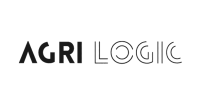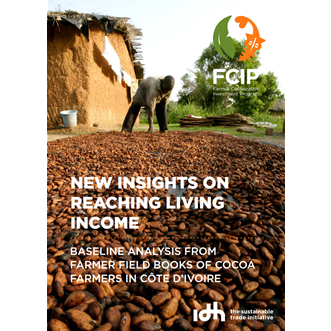For a major trader preparing to conduct several income diversification pilot projects, conduct baseline studies to assess current income levels and income sources of farmers in their supply chain. Household poverty was modeled using PPI and living income assessed in comparison to various benchmarks.

Rainforest Alliance Living Income Tool
On request of Rainforest Alliance, Agri-Logic developed a tool for its cocoa certification programme that allows certificate holders to quickly and reliably estimate the gap to the living income of farmers in its supply chain. The model in the tool was developed from a large set of Farmer Field Book time-series data from Ghana and Cote d’Ivoire. The model relies on the very strong relationship between a farmer’s production level and income. Tool users need only add data on 5 variables for each farmer to the tool. The 5 variables are in most instances already available in existing datasets of the certificate holder and as such require no additional data collection. Reliability testing showed the tool to be highly accurate, erring no more than a single percentage point when assigning farmers to above and below the living income categories. This tool is currently being rolled by Rainforest Alliance to cocoa certificate holders who wish to report on living income development.

Farmer segmentation for Sustainable Management Services (SMS)
Agri-Logic was requested by Sustainable Management Services (SMS) to assist in the development useful and meaningful segmentation methods that can be used to tailor services of SMS to farmers.
For farmer segmentation, Agri-Logic developed a multi-lingual dashboard, designed to allow the user to choose the segmentation logic by which farmer segmentation should occur. The dashboard shows the key characteristics of each segment, as defined by the user’s chosen settings. This can help the SMS operational teams to better target services to segments of farmers.

Commodities Export Development Nigeria
For AFEX Nigeria, an innovative commodities exchange connecting smallholder farmers to large scale buyers, we were contracted to develop commodities export with an initial focus on ginger and cocoa.
Based on a thorough due diligence to assess credibility, we generated recommendations to adjust the domestic trading template to export and facilitated market introductions to cocoa and spices buyers.

Assessment of the impact of certification on Ivorian cocoa farmers for Rainforest Alliance
What are the impacts of certification for cocoa farmers in Côte d’Ivoire? In an impact assessment for Rainforest Alliance Agri-Logic compared certified cocoa farmers with non-certified farmers. The assessment focused on comparing key outcomes: production, yields, profitability and income at farmer level as well as comparing the driving factors behind these outcomes and the contribution of certification to these outcomes.
Key findings of the impact assessment:
- Certified farmers show a greater reduction in the use of biocides that fall in the Highly Hazardous Pesticides group as defined by the Pesticide Action Network.
- Certified farmers are more likely to use fertilisers. Their higher rate of savings provides them with a greater capacity to invest. Nevertheless, their choice of fertiliser material is equally skewed towards phosphorus-based products and they show a similar nutrient imbalance with far too little nitrogen being applied as do non-certified farmers.
- The hours of work on carried out by minors is significantly lower on certified farms, after controlling for other factors, certified farmers use 33% less working hours made by minors. While the data does not allow the distinction between child labour and child work as defined by the International Organization of Labour (ILO), we conclude that the risk at child labour is lower at certified farms.
- Certified farmers dedicate fewer hours to activities that are likely to result in better yields such as pruning, collecting diseased pods and pruning of shade trees.
- Certified farmers are more likely to use formal banking services and tend to have lower debt levels and greater savings than non-certified farmers. These are of course desirable phenomena in their own right, but do not make certified farmers more profitable. Consequently, the incidence of poverty, whether measured as the share of farmers living below the international poverty line or the living income benchmark does not differ significantly between certified and non-certified farmers.
- Cocoa production drives much of the income that farmers obtain and without meaningful changes in farmers’ nutrient management (fertilising and using an appropriate type of fertiliser) we do not expect to see much change in the reduction of poverty among cocoa farmers. This phenomenon helps to explain why despite years of investment in cocoa-growing communities change on the ground has been limited.

Made-by-women specialty cocoa and chocolate
Thirty Six Foods has partnered with the Able Women Multipurpose Cooperative in Cross-River State and Rokbar to bring high quality and sustainable chocolate to market both in Nigeria and The Netherlands. The partners are creating a chocolate bar fully made by women and produced in Nigeria. The partnership aims to empower female cocoa farmers through access to specialty cocoa markets.
As part of the project partnership, Agri-Logic conducted a baseline measurement on farmer livelihoods and provided training on cocoa quality to the farmer’s cooperative. Agri-Logic also took on project management and reporting to partners.
The Able Women are now formally registered, trained and have a solar dryer in place. A commercial agreement between the cooperative and the chocolate company will ensure buying of cocoa going forward.

Cocoa sustainability management Nigeria & Ghana
The cocoa sector is constantly considering sustainability. Low quality and low yields are a continued focus. Livelihoods, poverty, nutrition and education require attention. Most large chocolate makers have committed to sourcing 100% certified as sustainable in 2020. Many of these end buyers require increased volumes of certified cocoa, while considering their impact targets beyond 2020. All international traders and several local exporters have partnered with these large chocolate brands for sustainable impact.
Through our consulting branch in Nigeria, we support implementers throughout West Africa in designing the project objectives, organization structure, traceability procedures and budget. We are working as a project liaison monitoring progress and impact. We have analysed the project baseline, and are monitoring progress. We identify any project risks that might affect certification status, our outreach targets and our credibility. We look for opportunities to increase impact.
We integrate sustainable impact with commercial objectives. Since 2016, we have supported our clients and partners who have reached out to a significant number of farmers across West Africa, and the numbers and impact keep expanding annually. UTZ certification was obtained, and the field presence is leveraged to increase impact on livelihoods.

Farmer segmentation for optimised service delivery
By assignment of IDH Sustainable Trade Initiative, Agri-Logic conducts 4 farmer segmentation studies to optimise service delivery by Supply Chain Management companies to farmers, in order to increase the impact at farmer level.
Many supply chain companies offer services to smallholder farmers to improve productivity, quality and profitability at farm level, and to secure their supply. The effect of these services at farm level is mixed and there is a strong desire to improve their performance. One way to do this is to group farmers in segments based on household and farmers characteristics. These segments are likely to have differing needs, development potential, ambition levels and investment rationales. When these segments are defined, services could possibly be better targeted and return on investment of service delivery could be improved.
The objective of this project is to gain experience with farmer segmentation exercises and to share the learnings of these experiences to support supply chain partners and IDH to segment farmers. Additionally, we aim to develop tailor-made services and products in order to increase the return on investment for supply chain partners, farmers and organizations that are co-investing in service delivery models. Four segmentation case studies are performed with coffee and cocoa supply chain partners in West- and East-Africa.
The envisioned results are:
- For each segmentation case study: identification of farmer segments, their defining characteristics and recommended tailor-made service packages
- A set of guidelines on how to monitor effects of service packages on different farmer segments and knowing when to change a strategy
- A framework for organisations on how to realize effective farmer segmentation to optimise service delivery

Farmer Field Book implementation Ghana
Sustainable Management Services Ghana (part of Ecom group), a number of its chocolate manufacturing clients and IDH, The Sustainable Trade Initiative run a large scale sustainability programme in Ghana targeting tens of thousands of cocoa farmers. The programme aims to improve their productivity, profitability and in turn enhance farmer loyalty. All parties expressed a need to gain better insight into farm and farmer performance and an enhanced understanding of the programme’s effects.
To meet the requirements, Agri-Logic is assisting Ecom and its partners to implement the Farmer Field Book. Close to 1,075 farmers across 43 districts keep daily records of all their activities, investments and outputs on their cocoa farms. This information is collected every 2 weeks and digitised in the FFB software. Every year each farmer receives a detailed agronomic and economic profit & loss statement as well as a group report that details the performance of each farmer versus that of his/her peers. Agri-Logic trains Ecom staff on implementation of the FFB and supports the implementation by analysing the collected data at different levels. At company level a sophisticated report is made each year that details the effects of Ecom-provided training and inputs to farmers on e.g. productivity, profitability and loyalty. Data from Ghana is then merged with FFB data from other cocoa-producing countries for meta analysis of the IDH cocoa programme.
Results so far:
- 64 Ecom management and staff trained in FFB implementation
- Same staff trained on farm level data analysis
- 1075 farmers keep records on a daily basis
- Collection of the third year’s data currently on-going

